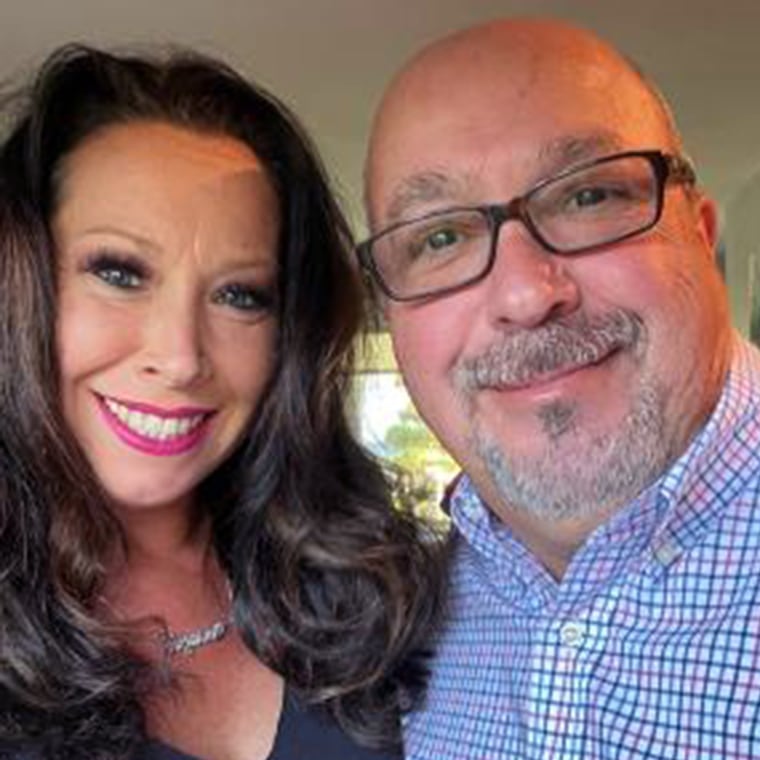Six months ago, Suzanne Calicchio experienced a major cardiac arrest and "miracle" recovery. It took doctors 33 tries to shock her heart back into rhythm, and now, she's raising awareness about the signs and symptoms of heart attacks in women.
Calicchio, 48, said that she came home from work on May 11 and felt some pain. She complained about the sensation to her fiancé, but wasn't immediately concerned. Her fiancé, Michael Barradas, told TODAY that he called an ambulance once Calicchio began to complain about numbness in her arms.
"I said 'Let's just get this over with and have them check you,' even though she's stubborn and doesn't like me to call the ambulance," Barradas said. "I said 'Let's just do it.'"

Calicchio told TODAY's Sheinelle Jones that she doesn't remember much of the evening after that: Her last memory, she said, was going into the ambulance after paramedics arrived. Barradas said that Calicchio was taken to the hospital after several tests were conducted. He followed the ambulance to the hospital, but wasn't allowed in to the emergency room due to pandemic-related restrictions.
"I had no clue what was going on for the first 45 minutes," Barradas said. "And that's when I started asking questions ... And that's when they finally brought me into (another) room and they told me she went into cardiac arrest. And I couldn't believe it. It drops your heart real fast. It's not a good feeling."
Meanwhile, Calicchio was under the care of Dr. James Ryan, the medical director of emergency medicine at St. Catherine of Siena Hospital in Smithtown, New York, who was working that night.
"I remember it very clearly," Ryan said. "I went to her bedside. She came in, she was able to talk to the triage nurse. When they called me, they moved her right to a bed ... She became unresponsive as soon as she got to the emergency department."
Calicchio was experiencing what's colloquially known as a "widow maker" heart attack. Ryan said that the team quickly moved to provide lifesaving measures.
"We went in, we shocked her," Ryan said. "We actually had to shock her, it was 33 times. I've been practicing emergency medicine about 35 years now and I can't remember a single other patient who had a shock 33 times and survived. After we worked on her for about an hour and 20 minutes ... We got her stabilized enough (for surgery)."
Ryan said that Calicchio was stabilized in surgery and transferred to another hospital, which specialized in cardiac care. He told TODAY that shocking someone back to life 33 times is "not common at all," but noted that Calicchio's age and "strong heart" meant he didn't want to give up on her.
"When we shocked her, she came back to a normal rhythm, and her heart was beating and trying to keep going," Ryan said. "We saw that. And then when she stopped again, we shocked her again and she'd come back. So I guess she has a strong heart and she was fighting hard. We saw her keep coming back each time, so we kept going."
Calicchio said that after she woke up and learned what the emergency team had done to save her life, she was overwhelmed with gratitude.
"I'm just so thankful that they went over and beyond for me, not knowing who I was, not knowing what I was about in my life," Calicchio said. "They just kept going."
She said that now, she wants to help people understand the importance of listening to your body and responding to symptoms even if they don't seem dire: If she had ignored her own feelings and if her fiancé hadn't called an ambulance, she would have had the heart attack at home instead of in the emergency room.
"I would've died in my sleep," Calicchio said. "I absolutely would have been a goner ... The fact that I paid attention to how my body was reacting and I said something to (Barradas) and that he reacted, it was all just happened for a reason, I believe. The reason is that I'm supposed to be here, and I'm supposed to be with Mike and have a wedding and enjoy our lives."
"The main thing, walking away from this experience, is listening to your body," Calicchio continued. "You have to listen, and you can't be stubborn and put it under the rug, because that's when you're snatched away."
Ryan said that it's not unusual to see people delay calling 911 because they ignore their symptoms or think that they aren't a sign of anything wrong. Symptoms to never ignore include feelings of lightheadedness or dizziness, heavy or labored breathing and unexplained fatigue.
"One of the serious and concerning things about cardiac pain is it's usually not a terrible pain," Ryan said. "Some people just describe it as a mild pressure in their chest, and it doesn't feel too bad, so they think it's nothing. And sometimes they ignore it when in fact, sometimes even though it's not a severe pain, it can be immediately life threatening. In this case, if (Calicchio) had come to the hospital or had not come to the hospital for another 20 or 30 minutes, her chance of survival would have been reduced significantly."
Ryan emphasized that anyone who is experiencing chest pain, especially if they have risk factors or a family history of cardiac conditions, should come to the hospital immediately.
Related:


